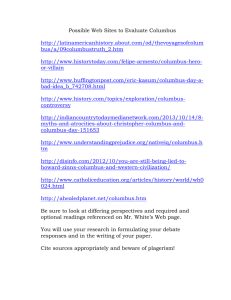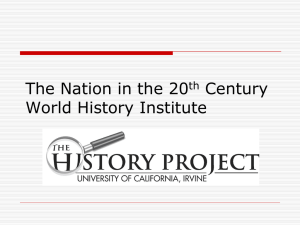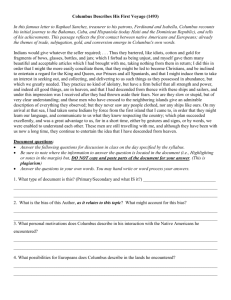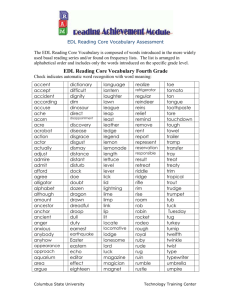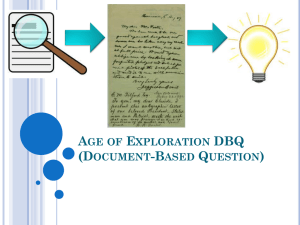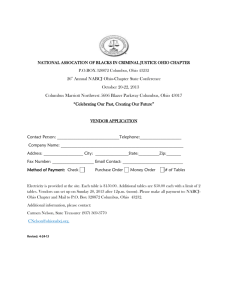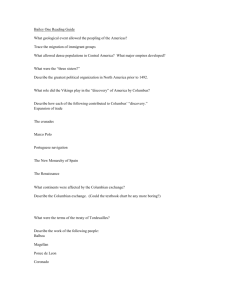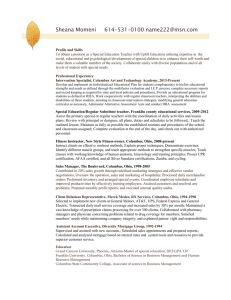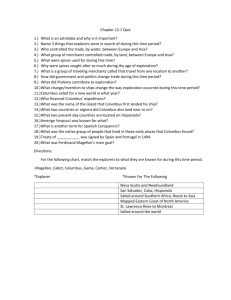In His Own Words: Christopher Columbus through Primary Sources
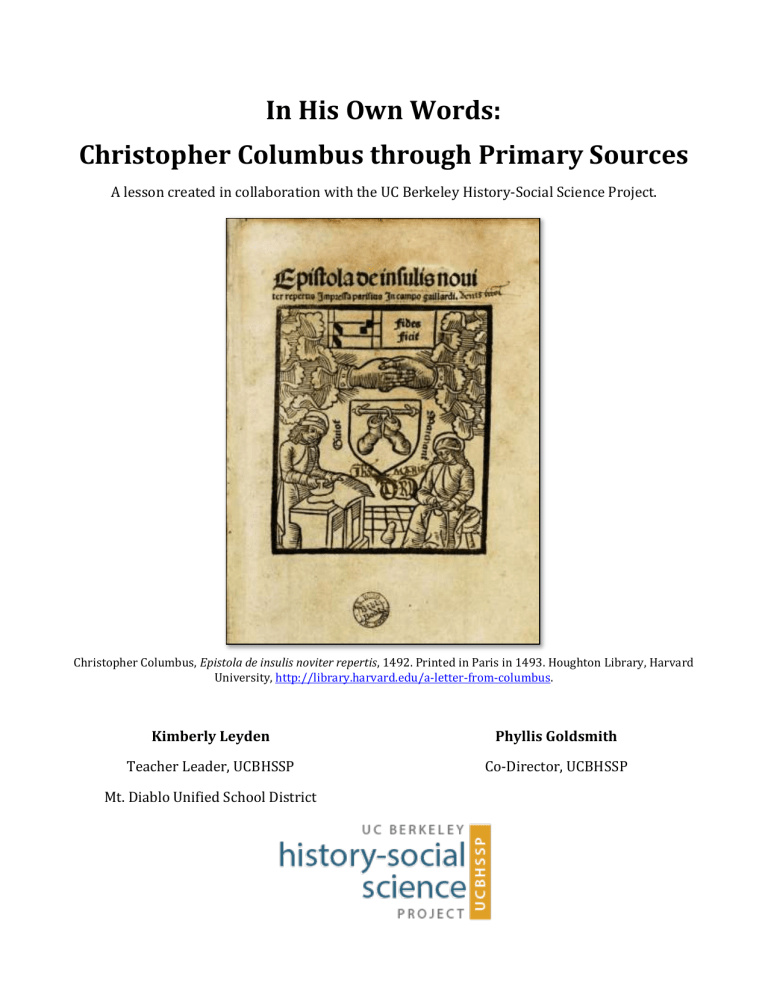
In His Own Words:
Christopher Columbus through Primary Sources
A lesson created in collaboration with the UC Berkeley History-Social Science Project.
Christopher Columbus, Epistola de insulis noviter repertis, 1492. Printed in Paris in 1493. Houghton Library, Harvard
University, http://library.harvard.edu/a-letter-from-columbus .
Kimberly Leyden Phyllis Goldsmith
Teacher Leader, UCBHSSP
Mt. Diablo Unified School District
Co-Director, UCBHSSP
In His Own Words: Christopher Columbus through
Primary Sources
LESSON OVERVIEW
LESSON OVERVIEW
This lesson emerged from a year-long study of historical thinking, based on the work of Peter Seixas. As a member of the UCBHSSP’s Teacher Research Group, Kimberly began rethinking how she taught the Age of Exploration. The resulting lesson allowed for students to better understand history as an interpretative discipline, which based arguments on available evidence.
Research Goal: Exploring historical thinking concepts as explained by Peter Seixas, students will learn to think historically by engaging in collaborative discussions, based on evidence, and articulating an argument.
Lesson Context: This lesson is part of a case study on Christopher Columbus. The case study is examined after a general overview of European exploration and is followed by a deeper study of explorers from a variety of European countries. In the case study, students are presented with three distinct types of text:
● An overview of Columbus from a textbook-like source.
● Encounter, an illustrated book of historical fiction that presents a Taino perspective.
Yolen, Jane. Encounter. Voyager Books, 1996.
● Primary sources – excerpts from a journal and letters written by Columbus.
Christopher Columbus, Extracts from Journal in the Fordham University Medieval Sourcebook, http://legacy.fordham.edu/halsall/source/columbus1.asp
Columbus reports on his first voyage, 1493. Gilder Lehrman Collection, https://www.gilderlehrman.org/history-by-era/exploration/resources/columbus-reportshis-first-voyage-1493
2
In His Own Words: Christopher Columbus through
Primary Sources
LESSON OVERVIEW
Lesson Focus Question: What were Columbus’s beliefs about the native people of the islands and how did
this affect his treatment of them?
Lesson Teaching Thesis: Columbus’s beliefs about the native people strongly affected how he treated them. He believed that he had discovered the islands (in Asia) and therefore thought Spain had rights of ownership. He regarded the native people as inferior believing that they were uncivilized, lacking in both religion and culture. While he was somewhat circumspect in what he wrote in his letter to Ferdinand and
Isabella, he was much more open about his opinions in his journal.
Lesson Components
Before examining the sources in this handout, students will read a text to gain background information on Columbus’s life and historical context. They will also examine the “discovery” narrative from the Taino perspective through historical fiction.
Background information about Columbus
Encounter by Jane Yolen
Learning Strategies for sources:
Excerpts from Columbus’ journal o In small groups, students read and discuss the excerpt from Columbus’s journal and then highlight sections to provide evidence about Columbus’s beliefs and treatment of native people, the Taino. o In a whole class discussion, students share what they discussed and highlighted. o Model how to use the Comparison chart to record the highlighted evidence. o Guide students to complete the Comparison chart.
Excerpts from Columbus’ letters to Ferdinand and Isabella o
Introduce the excerpts of Columbus’s letter to Ferdinand and Isabella. o
In small groups, students read the document and highlight sections they plan to use as evidence to explain Columbus’s beliefs and treatment of the Tainos. o
In a whole class discussion, students share what they highlighted. o
Guide students to add evidence from the letter to the Comparison chart.
Source Comparison Chart o Review the focus question: What were Columbus’s beliefs about the native people of the islands and how did this affect his treatment of them? o Students discuss differences in the accounts presented in the journal and letter. o Guide students to complete the last column on the Comparison chart
Writing Strategies: Analyzing and Citing Evidence
Students select evidence from the Comparison Chart to answer Focus Question by completing the
Evidence/Analysis chart.
Students then use Outline for Evidence/Analysis paragraph.
Model how to use the Evidence/Analysis chart and the outline to write a paragraph.
Using the completed paragraph outline, students write their final draft.
Learning Goal: Students write an opinion paragraph using specific evidence from the primary sources to make an argument about how Columbus’ beliefs influenced his treatment of the Tainos.
3
In His Own Words: Christopher Columbus through
Primary Sources
LESSON OVERVIEW
California History-Social Science Content Standards:
5.2 Students trace the routes of early explorers and describe the early explorations of the Americas.
California Historical and Social Sciences Analysis Skills:
Research, Evidence, and Point of View
1. Students differentiate between primary and secondary sources
Historical Interpretation
Common Core Reading Standards for Literacy in History/Social Studies 6-12:
Key Ideas and Details
1. Quote accurately from a text when explaining what the text says explicitly and when drawing inferences from the text.
Integration of Knowledge and Ideas
9. Integrate information from several texts on the same topic in order to write or speak about the subject knowledgeably
Common Core Writing Standards for Literacy in History/Social Studies 6-12:
Text Types and Purposes
1. Write opinion pieces on topics or texts, supporting a point of view with reasons and information.
Common Core Speaking and Listening Standards
Comprehension and Collaboration
1. Engage effectively in a range of collaborative discussions
4
Last Unit
Native Americans
Current Unit
The Age of Exploration
Case Study: Columbus o o o
Textbook Overview
Taino Perspective from Encounter
Columbus’ Perspective from journal and letter
Next Unit
Settlements in North America
Overview o o o
Reasons for Exploration
Map
Timeline is about
European exploration of the Americas
Focus Question: What were Columbus’s beliefs about the native people of the islands and how did this affect his
treatment of them?
Other European Explorers o English o Spanish o Dutch o French
Thinking Skills
● Using Evidence
● Perspective
● Compare and Contrast Unit Teaching Thesis: Columbus’s beliefs about the native people strongly affected how he treated them. He believed that he had discovered the islands (in Asia) and therefore thought Spain had rights of ownership. He regarded the native people as inferiors believing that they were uncivilized, lacking in both religion and culture.
While he was somewhat circumspect in what he wrote in his letter to Ferdinand and Isabella, he was much more open about his opinions in his journal.
In His Own Words: Christopher Columbus through
Primary Sources
SOURCE 1: Excerpt from Columbus’s Journal, 1492
Friday, October 12. At two o’clock in the morning the land was discovered . . . Arrived on shore, they saw very green trees, many streams of water, and diverse sorts of fruits. The
Admiral called upon the two Captains, and the rest of the crew who landed . . . to bear witness that he before all others took possession of that island for the King and Queen.
A number of the people of the island gathered together. Here follow the precise words of the Admiral: “As I saw that they were very friendly to us, and knew that they could be much more easily converted to our holy faith by gentle means than by force, I presented them with some red caps, and strings of beads to put around their necks, and many other things of little value, with which they were much delighted, and became wonderfully attached to us. Afterwards they came swimming to the boats, bringing parrots, balls of cotton thread, javelins, and many other things which they exchanged for articles we gave them, such as glass bead, and hawk’s bells; which trade was carried on with the utmost good will. But they seemed on the whole to me, to be a very poor people. They all go completely naked, even the women, though I saw but one girl. All whom I saw were young, not above thirty years of age, well made, with fine shapes and faces; their hair short, and coarse like that of a horse’s tail, combed toward the forehead, except a small portion which they wear long and never cut. Some paint the face, and some the whole body, others only the eyes, and others the nose. They do not have weapons nor know anything about them, for I showed them swords, they grasped them by the blades, and cut themselves through ignorance. They have no iron, their javelins being without it, and nothing more than sticks, though some have fish-bones or other things at the ends. They are all of a good size and stature, and handsomely formed. I saw some with scars of wounds upon their bodies, and I made signs to ask what they were; they answered me in the same way, that people from the other islands came with the plan to make prisoners of them and they defended themselves. . . . It appears to me, that the people are intelligent, and would be good servants and I believe that they would easily be made Christians, as they appear to
6
In His Own Words: Christopher Columbus through
Primary Sources
SOURCE 1: Excerpt from Columbus’s Journal, 1492 have no religion. They very quickly learn the words that are spoken to them. If it please our Lord, I plan to carry home six of them to your Highnesses, that they may learn our language.” These are the words of the Admiral.
Sunday, October 14. In the morning, I ordered the boats to be readied and coasted along the island to examine that part of it . . . for I wished to give a complete report to your
Highness, and also find where a fort might be built . . . I do not, however see the need of fortifying the place, as the people here are simple in war-like matters . . . I could conquer the whole of them with fifty men, and govern them as I pleased.
Christopher Columbus, Extracts from Journal in the Fordham University Medieval Sourcebook, http://legacy.fordham.edu/halsall/source/columbus1.asp
Discussion Questions:
1.
How does Columbus describe the land when he first sees it?
2.
How does Columbus describe the people when he first meets them?
3.
Based on his description, how does Columbus think the native people can benefit him?
7
In His Own Words: Christopher Columbus through
Primary Sources
SOURCE 1: Excerpt from Columbus’s Journal, 1492
KEY
Friday, October 12. At two o’clock in the morning the land was discovered . . . Arrived on shore, they saw very green trees, many streams of water, and diverse sorts of fruits. The
Admiral called upon the two Captains, and the rest of the crew who landed . . . to bear witness that he before all others took possession of that island for the King and Queen.
A number of the people of the island gathered together. Here follow the precise words of the Admiral: “As I saw that they were very friendly to us, and knew that they could be much more easily converted to our holy faith by gentle means than by force, I presented them with some red caps, and strings of beads to put around their necks, and many other things of little value, with which they were much delighted, and became wonderfully attached to us. Afterwards they came swimming to the boats, bringing parrots, balls of cotton thread, javelins, and many other things which they exchanged for articles we gave them, such as glass bead, and hawk’s bells; which trade was carried on with the utmost good will. But they seemed on the whole to me, to be a very poor people. They all go completely naked, even the women, though I saw but one girl. All whom I saw were young, not above thirty years of age, well made, with fine shapes and faces; their hair short, and coarse like that of a horse’s tail, combed toward the forehead, except a small portion which they wear long and never cut. Some paint the face, and some the whole body, others only the eyes, and others the nose. They do not have weapons nor know anything about them, for I showed them swords, they grasped them by the blades, and cut themselves through ignorance. They have no iron, their javelins being without it, and nothing more than sticks, though some have fish-bones or other things at the ends. They are all of a good size and stature, and handsomely formed. I saw some with scars of wounds upon their bodies, and I made signs to ask what they were; they answered me in the same way, that people from the other islands came with the plan to make prisoners of them and they defended themselves. . . . It appears to me, that the
8
In His Own Words: Christopher Columbus through
Primary Sources
SOURCE 1: Excerpt from Columbus’s Journal, 1492 people are intelligent, and would be good servants and I believe that they would easily be made Christians, as they appear to have no religion. They very quickly learn the words that are spoken to them. If it please our Lord, I plan to carry home six of them to your
Highnesses, that they may learn our language.” These are the words of the Admiral.
Sunday, October 14. In the morning, I ordered the boats to be readied and coasted along the island to examine that part of it . . . for I wished to give a complete report to your
Highness, and also find where a fort might be built . . . I do not, however see the need of fortifying the place, as the people here are simple in war-like matters . . . I could conquer the whole of them with fifty men, and govern them as I pleased.
Discussion Questions:
1. How does Columbus describe the land when he first sees it?
● At two o’clock in the morning the land was discovered
● Arrived on shore, they saw very green trees, many streams of water, and diverse sorts of fruits
2. How does Columbus describe the people when he first meets them?
● As I saw that they were very friendly to us, and knew that they could be much more easily converted to our holy faith by gentle means than by force
● But they seemed on the whole to me, to be a very poor people.
● They do not have weapons nor know anything about them
3. Based on his description, how does Columbus think the native people can benefit him?
● It appears to me, that the people are intelligent, and would be good servants and I believe that they would easily be made Christians, as they appear to have no religion
● I could conquer the whole of them with fifty men, and govern them as I pleased.
9
In His Own Words: Christopher Columbus through
Primary Sources
SOURCE 2: Excerpt from Columbus’s Letter to Ferdinand and Isabella, 1493
. . . Thirty-three days after my departure from Cadiz I reached the Indian Sea, where I discovered many islands, thickly peopled, of which I took possession without resistance in the name of our most illustrious Monarch, by public proclamation and with unfurled banners.
. . . They are all, as I said before, without any sort of iron, and they do not have any weapons, which are unknown to them, and for with they are not adapted: not because of any bodily deformity, but because they are timid and full of terror. They carry, however, canes dried in the sun in place of weapons, upon whose roots they fix a wooded shaft, dried and sharpened to a point. But they never used them; for it has often happened, that when I sent two or three of my men to some of their villages to speak with the inhabitants, a crowd of Indians came forth; but when they saw our men approaching, they speedily took flight, parents abandoning children, and children their parents. This did not happen because we had injured or stolen from them. On the contrary I gave whatever I had, cloth and many other things without expecting anything in return; but they are by nature fearful and timid. But when they see that they are safe and all fear is banished, they are very naive and honest, and very giving of all they have. No one refuses the asker anything that he has; on the contrary they invite us to ask for it. They show the greatest affection towards all of us, exchanging valuable items for things of little value, content with the very least thing or nothing at all. But I forbade giving them items of little or no value . . . because it was plainly unjust; and I gave them many beautiful and pleasing things, which I brought with me, in order to win their affection, and that they might become Christians and love our King and Queen . . .
. . . On my arrival, I had taken some Indians by force from the first island that I came to, in order that they might learn our language, and communicate to us what they knew about the country; the plan succeeded, and was a great advantage to us for in a short time, either
10
In His Own Words: Christopher Columbus through
Primary Sources
SOURCE 2: Excerpt from Columbus’s Letter to Ferdinand and Isabella, 1493 by gestures and signs, or by words, we were able to understand each other. These men are still traveling with me, although they have been with us now a long time, they continue to entertain the idea that I have descended from heaven; and on our arrival at any new place they announced this, crying out immediately with a loud voice to the other Indians, “Come, come, you will see Men from Heaven,” after which women and men, children and adults, when they got rid of their fear, would crowd the roads to see us, some bringing food, others drink, with astonishing affection and kindness . . .
Finally, to sum up in a few works the results and advantages of our journey, I promise to our most invincible Sovereigns, that if they give me some assistance, I will acquire for them as much gold as they need, a great quantity of spices, cotton, and mastic, and as many heathen slaves as their majesties may choose to demand. I also promise rhubarb and other sorts of drugs, which I believe the men I left behind in the fort have found already and will continue to find; for I stayed no longer than I had to because of winds, except while I was providing for the construction of a fort in the city of Navidad, and for making all things safe for the men I left there . . .
Such are the events that I have briefly described. Farewell.
Lisbon, March 14, 1493
Christopher Columbus
Admiral of the Fleet of the Ocean
Columbus reports on his first voyage, 1493. Gilder Lehrman Collection, https://www.gilderlehrman.org/history-byera/exploration/resources/columbus-reports-his-first-voyage-1493
Discussion Questions:
1.
How does Columbus describe the people?
2.
Based on his description, how does Columbus think the native people can benefit the king and queen of Spain?
3.
Complete the comparison chart.
11
In His Own Words: Christopher Columbus through
Primary Sources
SOURCE 2: Excerpt from Columbus’s Letter to Ferdinand and Isabella, 1493
Beliefs natives?
How does Columbus describe the
How does Columbus describe trade with natives?
Journal Letter
How are they similar? Different?
What does
Columbus believe about the natives’ religion?
Weapons
What are
Columbus’s plans for the natives?
4.
How are the two documents similar? How are they different?
5.
Why do you think he changes his words depending on his audience?
12
In His Own Words: Christopher Columbus through
Primary Sources
SOURCE 2: Excerpt from Columbus’s Letter to Ferdinand and Isabella, 1493
KEY
. . . Thirty-three days after my departure from Cadiz I reached the Indian Sea, where I discovered many islands, thickly peopled, of which I took possession without resistance in the name of our most illustrious Monarch, by public proclamation and with unfurled banners.
. . . They are all, as I said before, without any sort of iron, and they do not have any weapons, which are unknown to them, and for with they are not adapted: not because of any bodily deformity, but because they are timid and full of terror. They carry, however, canes dried in the sun in place of weapons, upon whose roots they fix a wooded shaft, dried and sharpened to a point. But they never used them; for it has often happened, that when I sent two or three of my men to some of their villages to speak with the inhabitants, a crowd of Indians came forth; but when they saw our men approaching, they speedily took flight, parents abandoning children, and children their parents. This did not happen because we had injured or stolen from them. On the contrary I gave whatever I had, cloth and many other things without expecting anything in return; but they are by nature fearful and timid. But when they see that they are safe and all fear is banished, they are very naive and honest, and very giving of all they have. No one refuses the asker anything that he has; on the contrary they invite us to ask for it. They show the greatest affection towards all of us, exchanging valuable items for things of little value, content with the very least thing or nothing at all. But I forbade giving them items of little or no value . . . because it was plainly unjust; and I gave them many beautiful and pleasing things, which I brought with me, in order to win their affection, and that they might become Christians and love our King and Queen . . .
. . . On my arrival, I had taken some Indians by force from the first island that I came to, in order that they might learn our language, and communicate to us what they knew about
13
In His Own Words: Christopher Columbus through
Primary Sources
SOURCE 2: Excerpt from Columbus’s Letter to Ferdinand and Isabella, 1493 the country; the plan succeeded, and was a great advantage to us for in a short time, either by gestures and signs, or by words, we were able to understand each other. These men are still traveling with me, although they have been with us now a long time, they continue to entertain the idea that I have descended from heaven; and on our arrival at any new place they announced this, crying out immediately with a loud voice to the other Indians, “Come, come, you will see Men from Heaven,” after which women and men, children and adults, when they got rid of their fear, would crowd the roads to see us, some bringing food, others drink, with astonishing affection and kindness . . .
Finally, to sum up in a few works the results and advantages of our journey, I promise to our most invincible Sovereigns, that if they give me some assistance, I will acquire for them as much gold as they need, a great quantity of spices, cotton, and mastic, and as many heathen slaves as their majesties may choose to demand. I also promise rhubarb and other sorts of drugs, which I believe the men I left behind in the fort have found already and will continue to find; for I stayed no longer than I had to because of winds, except while I was providing for the construction of a fort in the city of Navidad, and for making all things safe for the men I left there . . .
Such are the events that I have briefly described. Farewell.
Lisbon, March 14, 1493
Christopher Columbus
Admiral of the Fleet of the Ocean
Columbus reports on his first voyage, 1493. Gilder Lehrman Collection, https://www.gilderlehrman.org/history-byera/exploration/resources/columbus-reports-his-first-voyage-1493
Discussion Questions:
1.
How does Columbus describe the people?
● They are all, as I said before, without any sort of iron, and they do not have any weapons, which are unknown to them, and for with they are not adapted: not because of any bodily deformity, but because they are timid and full of terror
● they are very naive and honest, and very giving of all they have
14
In His Own Words: Christopher Columbus through
Primary Sources
SOURCE 2: Excerpt from Columbus’s Letter to Ferdinand and Isabella, 1493
2.
Based on his description, how does Columbus think the native people can benefit the king and queen of Spain?
● They might become Christians and love our King and Queen . . .
● I will acquire for them as much gold as they need, a great quantity of spices, cotton, and mastic, and as many heathen slaves as their majesties may choose to demand. I also promise rhubarb and other sorts of drugs
3.
Complete the comparison chart.
Beliefs Journal Letter
How are they similar?
Different?
How does Columbus describe the natives?
I saw that they were very friendly to us they seemed . . . to be a very poor people
It appears to me, that the people are intelligent, and would be good servants they are by nature fearful and timid they are very naive and honest, and very giving of all they have
In the journal he focuses on how they are friendly, poor and would make good servants.
In the letter he focuses on how they are fearful, timid, and giving
How does Columbus describe trade with natives?
I presented them with some red caps, and strings of beads to put around their necks, and many other things of little value they came swimming to the boats, bringing parrots, balls of cotton thread, javelins, and many other things which they exchanged for articles we gave them
They show the greatest affection towards all of us, exchanging valuable items for things of little value, content with the very least thing or nothing at all. But I forbade giving them items of little or no value
. . . because it was plainly unjust; and I gave them many beautiful and pleasing things
In the journal he is very open about trading things of little value with the native for items that he wants and values.
In the letter, the natives want to trade for items of little value, but he forbade it because it would not be fair. He wants to look like the good guy.
What does
Columbus believe about the natives’ religion?
I believe that they would easily be made
Christians, as they appear to have no religion
I gave them many beautiful and pleasing things, which I brought with me, in order to win their affection, and that they might become
Christians and love our
In the journal Columbus writes that the natives have no religion.
In the letter he focuses on winning them to
Christianity, and adds that the natives think he
15
In His Own Words: Christopher Columbus through
Primary Sources
SOURCE 2: Excerpt from Columbus’s Letter to Ferdinand and Isabella, 1493 descended from heaven. King and Queen they continue to entertain the idea that I have descended from heaven
Weapons They do not have weapons nor know anything about them they do not have any weapons, which are unknown to them
The two documents are the same
What are
Columbus’s plans for the natives?
I plan to carry home six of them
I could conquer the whole of them with fifty men, and govern them as
I pleased
I will acquire (for their majesties) as much gold as they need, a great quantity of spices, cotton, and mastic, and as many heathen slaves as their majesties may choose to demand
In the journal the focus is on Columbus and what he plans to do.
In the letter Columbus tells the king and Queen what he will do for them
4.
How are the two documents similar? How are they different?
Columbus’s description of the natives and his beliefs about their religion and weaponry are similar in both documents. How he presents trading with the natives and his plans are very different. In the journal he appears to feel it is fine to trade cheap items for what he wants. In the letter he tells the king and queen that he stopped the trading of cheap items because it was not fair to the natives. In the journal Columbus’s focuses more on plans to benefit himself. In the letter his focus is on how his actions will benefit the king and queen.
5.
Why do you think he changes his words depending on his audience?
He doesn’t want to offend the king and queen. He wants to make a good impression. He may not be sure
about how they feel. He also may be concerned about public opinion.
16
In His Own Words: Christopher Columbus through
Primary Sources
WRITING STRATEGY: Analyzing and Citing Evidence
Writing Prompt: What were Columbus’s beliefs about the native people of the islands and how did this affect his treatment of them?
Thesis: _____________________________________________________________________________________________
______________________________________________________________________________________________________
Evidence /Facts/Quotes Analysis
This means that . . .
This shows . . .
Source
Thesis Statement: Answers the question or prompt and makes a claim about the issue.
Evidence: Details about the topic: definitions, examples, dates, & names.
Analysis: This answers the question: “So what?” or “Why is this significant or important?”
17
In His Own Words: Christopher Columbus through
Primary Sources
WRITING STRATEGY: Analyzing and Citing Evidence
KEY
Writing Prompt: What were Columbus’s beliefs about the native people of the islands and how did this affect his treatment of them?
Student Thesis: Columbus’s beliefs about the native people of the islands affected how he and his men treated them.
Evidence /Facts/Quotes Analysis
This means that . . .
This shows . . .
Source he believed he discovered the islands he could claim them for the King and
Queen of Spain
Journal and
Letter
Columbus gave them caps, strings of beads, and other things of little value (J) traded glass beads and hawk’s bells for parrots, balls of cotton and javelins (J) the natives were “very giving of they have” (L)
“exchanging valuable items for things of little value” (L)
Columbus and his men were able to trade items of little or no value for items that they wanted and valued
Journal (J)
Letter (L)
“they could easily be made Christians, as they appear to have no religion”
Columbus planned to convert the natives to Christianity
Journal do not have weapons or iron (B) captured six natives to bring back to
Spain (B) are not war-like (J)
“I could conquer the whole of them with fifty men, and govern them as I pleased”
(J)
“timid and full of terror” (L)
“they are by nature fearful and timid” (L)
Columbus believed that natives would be easy to conquer and enslave
Journal (J)
Letter (L)
Both (B)
Thesis Statement: Answers the question or prompt and makes a claim about the issue.
Evidence: Details about the topic: definitions, examples, dates, & names.
Analysis: This answers the question: “So what?” or “Why is this significant or important?”
18
In His Own Words: Christopher Columbus through
Primary Sources
OUTLINE for EVIDENCE/ANALYSIS PARAGRAPH
Focus Question: What were Columbus’s beliefs about the native people of the islands and how did this affect his treatment of them?
Title:
_________________________________________________
Thesis Statement: ________________________________________________________________________________
_______________________________________________________________________________________________________
Evidence: __________________________________________________________________________________________
_______________________________________________________________________________________________________
Analysis: ___________________________________________________________________________________________
_______________________________________________________________________________________________________
Evidence: __________________________________________________________________________________________
_______________________________________________________________________________________________________
Analysis: ___________________________________________________________________________________________
_______________________________________________________________________________________________________
Evidence: __________________________________________________________________________________________
_______________________________________________________________________________________________________
Analysis: ___________________________________________________________________________________________
_______________________________________________________________________________________________________
Evidence: __________________________________________________________________________________________
_______________________________________________________________________________________________________
Analysis: ___________________________________________________________________________________________
_______________________________________________________________________________________________________
Concluding Statement: __________________________________________________________________________
______________________________________________________________________________________________________
______________________________________________________________________________________________________
19
In His Own Words: Christopher Columbus through
Primary Sources
OUTLINE for EVIDENCE/ANALYSIS PARAGRAPH
Focus Question: What were Columbus’s beliefs about the native people of the islands and how did this affect his treatment of them?
KEY
Columbus’s Treatment of the Native People of the Islands
Columbus’s beliefs about the native people of the islands affected how he and his men treated them. Columbus believed he had discovered the islands even though there were already people living there. His belief that he had discovered the islands meant that he could claim them for the King and Queen of Spain. Columbus states in his letter to
Ferdinand and Isabella that the natives were “very giving of all they had” even
“exchanging valuable items for things of little value.” Because of this Columbus and his men were able to trade glass beads, hawk’s bells, and other items of little value for balls of cotton thread, javelins, and other more valuable items. In his journal Columbus writes, “I believe that they (the natives) would easily be made Christians, as they appear to have no religion.” Both in his journal and in his letter Columbus mentions more than once his plan to convert the natives to Christianity. Columbus states in both his journal and in his letter that the island people did not have iron or weapons. He felt that they were not war-like but were instead “timid and full of terror.” As a result, Columbus captured six natives to bring back to Spain. He wrote in his journal, “I could conquer the whole of them with fifty men, and govern them as I pleased.” In conclusion, Columbus’s attitude toward the native people of the islands affected not only how he treated them during his first visit, but also his future plans for the islands and their people.
20
